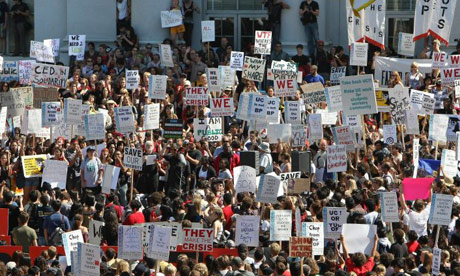
University of California Berkeley students and faculty protest against fee increases and budget cuts. Photograph: Justin Sullivan/Getty
In the sweltering California heat with their placards, posters, red armbands and chants of "no cuts, no fees, education should be free", the demonstrators packed in to Sproul Plaza at the centre of University of California Berkeley campus today meant business.
The crowd cheered and passing cars hooted as speakers implored them to fight state authorities' plans to hike student fees and lay off workers.
Daniella, a petite second-year Latina undergraduate sitting quietly in the shade echoed what many making the rallying calls were articulating. "My whole life I wanted to come here. If they increase the fees I will have to drop out. We have to fight this."
The Berkeley protest was one of many held across California in an unprecedented day of action directed at university authorities and state governor, Arnold Schwarzenegger as he attempts to curb the state's multibillion-dollar budget crisis. Faculty, students and unions from the University of California's 10 campuses including its two most prestigious, UCLA and Berkeley, joined forces in what was the biggest student protest for more than a generation.
The scale of the protests has come as a shock to state authorities. What began as a marginal dispute in the summer between university faculty and their management over cuts in salaries has in recent weeks escalated into a statewide walkout by students and faculty as well as a day of strike action by campus technical workers against layoffs and diminished terms and conditions.
The turning point came two weeks ago when university authorities warned of savage budget cuts to deal with a $750m (£466m) shortfall and mooted huge increases in the cost of tuition. "UC regents vote next week to raise student fees, already up 250% over the last decade, by an additional 30%," was how one group of protesters summed up the situation today.
In a move that will reignite debates around racial inequities in education one group demonstrating labelled the proposed hike in fees as "twisted and racist", saying it would mean more low-income and ethnic minority students would be unable to afford a college education. They also criticised proposals to increase the proportion of out-of-state students - who pay markedly higher fees - to 26% alleging it would further reduce the opportunities for young people from low-income groups or ethnic minorities living in California to secure a university place.
In a swipe clearly directed at the governor's office one provocative leaflet read: "Annually the state pays $49,000 per prison inmate and less than $14,000 per UC student. If the state can lock us up, it can invest in our education for one-third of the cost."
A spokesman for the group Graduate Students of Colour said: "Students of colour are asking a crucial question: Why now, and why us? California's population of college-age adults is majority black and brown. Whatever other reasons are cited, that underlying condition is left unspoken."
In recent years student demonstrations in California have been small-scale and largely single issue-led such as those held after Hurricane Katrina when students protested against the Bush administration's response in the immediate aftermath. Signs that the latest protests were different and that feelings were running especially high were evident in the run-up to the walkout with fringe meetings mushrooming across campuses to galvanise support. At UC Berkeley activists could be seen donning red armbands while at UC Davis one preliminary protest yesterday included a "naked" demonstration by a small group of students accusing authorities of "stripping" the education system.
Facebook and Twitter campaigns were also launched while over a thousand faculty members across all campuses signed an online petition rejecting budget cuts and proposing alternative ways to save money such as trimming the salaries of education bosses and senior officials plus tapping into reserve funds.
For many this latest wave of protest in California is reminiscent of the 1960s when UC Berkeley in particular earned a reputation as the epicentre of student activism when it spawned the Free Speech Movement. It was also the last time a former Hollywood actor, Ronald Reagan, was governor. Author and scholar at UC Berkeley's geography department Gray Brechin, who was an undergraduate at Berkeley during the 60s unrest said the current dispute had been "simmering" under the surface for months.
He said many in the university are concerned that California's budgetary problems are being used as "an excuse" to dismantle the state's public university system and move it toward a system reliant on private donors for funding. "California is beyond broke. The wealthiest state in the nation is bankrupt. These problems began a long time ago. What we need is a more progressive tax system to fund the university, not to dismantle it."
The UC system, the largest network of its kind in the US with over 220,000 students and more than 170,000 faculty, is widely regarded as a flagship public university often outperforming privately-funded prestigious schools such as Stanford just a few miles from Berkeley in the home of hi-tech, Silicon Valley. University authorities have staunchly denied suggestions of an attempt to undermine public education.
California's colossal budget crisis has become an ever-increasing thorn in the side of the governor as more people feel the pain of cuts in expenditure on schools and other services on top of the fallout from recession. The state is an estimated $15bn in debt with no way out in sight.
Today's protests come close on the heels of another politically sensitive initiative. Just last week the governor granted early release to thousands of prisoners in a cash-saving exercise. But if the prisoner release controversy was embarrassing, the dramatic public education furore looks set not only to be a more enduring and contentious problem but possibly one that attracts nationwide attention.
No comments:
Post a Comment